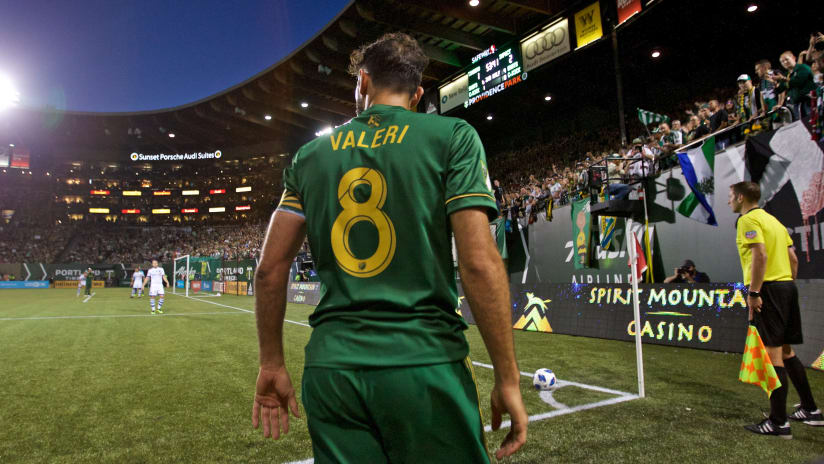PORTLAND, Ore. – Long unbeaten streaks usually offer few chances for come-from-behind results. Teams that go on those runs usually live life in control, on the front foot, and while it wouldn’t be quite right to say the Portland Timbers have dictated play in each of the 13 games that are part of MLS’ longest loss-less run of 2018, the times the team has had to claw back since the team's last loss are few and far between.
In fact, only once in MLS play since then, before tonight, had Portland been down in a game: June 2; at home against the LA Galaxy; for 37 minutes after Chris Pontius opened the scoring in a 1-1 draw.
On Saturday night, the Montreal Impact took two first half leads against the Timbers, with Saphir Taïder (23rd minute) and Matteo Mancosu (41st) hinting the Timbers Army may have deal with a first, this season, at Providence Park: a loss. Instead, after equalizers from Samuel Armenteros (39th) and Diego Valeri (65th), the Timbers run marches on, even if the team did drop two points at home.
“The fact that we traveled, we stayed away these trips, three games,” Timbers head coach Giovanni Savarese explained, describing a preparation period that allowed Portland only one practice session since their mid-week return from Los Angeles. “The first half, we didn’t have the best first half. But the best part is the guys, they came back in the second half and gave everything they had, and we almost won the game.”
The Timbers outshot Montreal 11-2 from the 53rd minute on, and although two Evan Bush handling errors were crucial to Portland’s scores, the match’s final 25 minutes (after Valeri’s goal) were mostly played in front of Providence Park’s North End, and Bush’s goal. Portland held 70 percent of the possession during that time, exerting the type of pressure some Timbers felt the team should applied from the opening whistle.
“We played so bad (in) the first half – so lazy,” Sebastián Blanco said, displaying a level of frustration you rarely find in the Argentine creator. The Timbers’ attacker was more concerned than irate, coming to grips with his disbelief while managing his English interview, yet he still could keep some blunt assessment from coming through.
“We couldn’t find the spaces. We moved the ball so slow. [Montreal] were comfortable.”
They also had success playing right at the Timbers’ defense, as the Impact often did early, firing diagonal balls from left-to-right to try and hit Portland’s backline before it could set up. While the home side didn’t succumb to that tactic, it did snap amid Alejandro Silva’s run with the ball in the 23rd, setting up Taider, and Ignacio Piatti’s long ball from inside his own half to find Mancosu before intermission.
“The second goal is not us,” Savarese said, bluntly. “The second goal that they scored, we basically stood in the line and didn’t drop enough to cover the space in behind. Those are things our defenders usually don’t do.”
What those mistakes did do, though, was set up a test the Timbers have rarely had to pass since April. Not once but twice, Portland had to come back to preserve a result. What’s more, in a game where they would have expected three points before kickoff, the team continued to embrace that challenge, not merely resting on the point they restored with Valeri’s goal.
“They fought all the way to the end. That’s what we want,” Savarese explained. “This is a team that never gives up, and they did that. They believed all the way to the end.
“The games that we have played, usually we have been the team that scored first. But I thought it was a good response … The mentality is good, and they continue showing that.”
It was a level of aggression which, in this space, we have wondered about, before. On July 7 against the San Jose Earthquakes, the Timbers had trouble closing out each half, eventually allowing their guests to threaten a point late in Portland’s 2-1 win. Savarese said his team “suffered.” Last Sunday in Los Angeles, despite LAFC going down to 10 with six minutes left in regulation, the Timbers weren’t able to shift gears and mount a late charge. Stifling heat may have been the problem, there.
Tonight, for one half, Portland did show a dominant version of itself. Even after Montreal was equalized for a second time and had reason to pursue the game more, the Timbers kept their foot on the gas. They played like the aggressors, the hunters – whatever dominant visage you want to evoke. They played like a team that’s becoming more comfortable with their front foot.
“Yes, we responded well, but it’s not enough,” Blanco, embracing his ennui, retorted. “It’s not enough. We need to play the whole game like the second half. We can’t lose points at home. We have a four-game stretch, here, and it’s very important, if we want to fight for the top spot in the table.
“I was very disappointed in the first half, but I was very happy with the second, but it’s not enough. We need to work mentally, and sometimes, we need to work on the team’s spirit, because the first half, we played so, so lazy.”
Perhaps those standards, that mentality, speak to how far the Timbers have come. Zarek Valentin alluded as much, saying it’s “something I think has been a huge change in the past year, just our mentality in general.” Perhaps the team has reached a point where progress isn’t enough?
Yes, the team showed a better mentality on the front foot, and in their response to Montreal’s goals, Portland handled challenges they’ve rarely faced since April. On Saturday, though, the only challenge that mattered to some was the final score. Maybe that’s a type of progress on its own.












